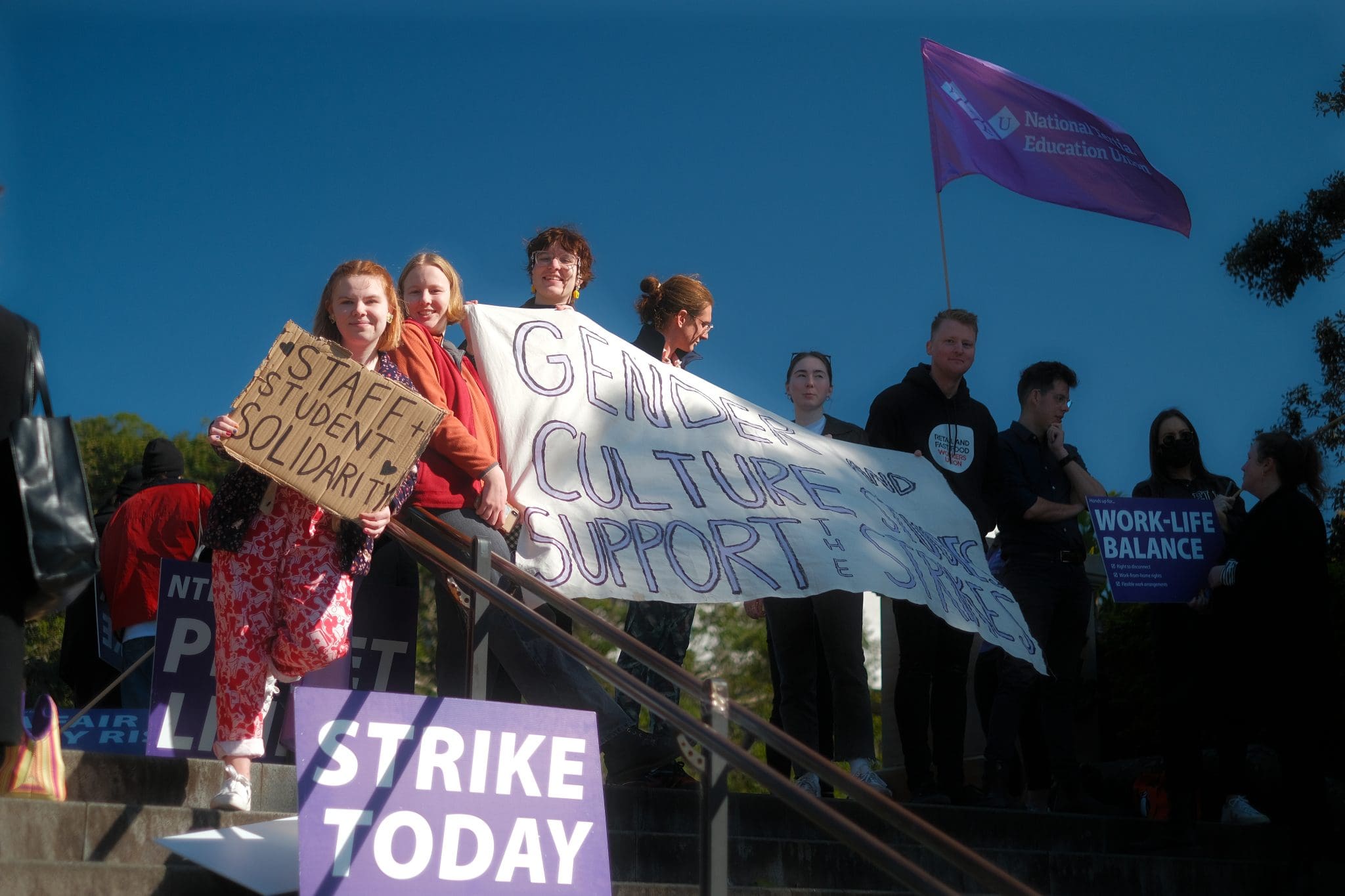For first years and new students, university can appear to be a place of wonder. As one of the university’s taglines, “Leadership for Good,” USyd prides itself on nurturing the next generation of movers and shakers. However, corporate slogans and flashy adverts mask the policies of austerity which cripple the people who run the university — tutors, lecturers and staff. Staff pay and conditions are dependent on an enterprise bargaining process between the University and trade unions which represent them, meaning these negotiations have immense importance for staff and students at the University and, given the importance of USyd in Australia’s higher education landscape, beyond.
The University of Sydney, the National Tertiary Education Union (NTEU), and the Community and Public Sector Union (CPSU) have been engaged in enterprise bargaining since the previous agreement between them expired in 2021. Since then, the parties have met over 29 times for formal bargaining meetings. In that time, there have been six days of staff strikes, supported by students, against University management.
Despite recording a $1.04B surplus in 2021, university management continues to reject calls for a pay rise over inflation, an end to casualisation, and annualised gender affirmation leave, amongst other staff demands. Deputy Vice-Chancellor and Provost Annamarie Jagose has blamed extended negotiation period on “the volume of claims made by staff unions” and “union intransigency on academic matters.” Jagose has also described staff claims as “excessive.”
On 8 December 2022, Jagose sent an all-staff email providing an update on Enterprise Bargaining between the University, the NTEU and CSPU. That email contained details of preliminary agreements between the parties.
It is clear that the bargaining process will continue into 2023, with more strikes likely. Honi explains what the parties have agreed and what is yet to come.
Pay
The parties are yet to agree on the pay increase offered to staff. In the all-staff email, Jagose said that “it is not yet possible” for the University to make an offer because it is “waiting for both unions to confirm their wage claims.”
The University paid a 2.1% annual pay rise and a one-off payment of $1000 to staff in July 2022. This payment, substantially below the rate of inflation, would see staff receive a pay cut in real terms.
The USyd Branch Committee of the NTEU has previously endorsed a motion to increase their wage claim to the Cost Price Index (CPI) plus 2.5% annually. The NTEU has since officially lodged a claim of CPI plus 1.5%. This would entail a pay rise substantially above what the University is currently offering, which would fail to assist staff struggling amid the cost of living crisis.
Casual employees
The University has only agreed to minor improvements for casual workers, as major staff demands remain unanswered. The University will “advertise an additional 300 continuing academic positions over the life of the agreement” according to Jagose. This equates to less than a hundred additional positions a year across what would be a four-year agreement.
Current staff will only receive priority, rather than being guaranteed these opportunities.
The University will also commit, it has told staff, to take “reasonable steps” to achieve a 20% reduction in the proportion of casual staff over three years.
The University of Sydney employs approximately 10,000 casual staff, meaning that the University’s current position would leave thousands of workers on casual contracts. A Senate report in 2021 found that casual employees at Australian universities were victims of “systemic” wage theft. The University of Sydney admitted in 2021 of underpaying casual staff by $12.75 million between 2014 and 2020.
The proposed agreement set out in Jagose’s email staff did not include any remedies for the insecurity of casual work at the University.
Leave allowances
The University and unions have agreed to small improvements to staff’s leave allocations. Barriers to accessing “enhanced” parental leave have been somewhat reduced and menstrual and menopausal leave will now be available without the need for documentation. Small increases to the allocations of natural disaster, compassionate leave, emergency services leave are also included.
The parties’ in principle agreement to offer a lump sum of 30 days of gender affirmation leave remains unchanged, despite many staff and students maintaining the need for an annual allocation of 30 days.
Aboriginal and Torres Strait Islander Staff
Jagose told staff that the proposed agreement will also recognise Aboriginal and Torres Strait Islander staff’s cultural obligations. The proposed agreement will also include an increase in ceremonial leave available to Aboriginal and Torres Strait Islander staff and the payment of a language allowance to staff who are asked to use a First Nations language at work.
There is still no agreement on the Unions’ claim for an enforceable target of 3% Indigenous staff with Jagose saying that “discussions remain ongoing.” Indigenous staff currently compromise less than 1.5% of the University’s staff. Only 15% of Indigenous staff members have secure contracts at USyd, compared to 25% of all staff.
Workload and other changes
Jagose’s email said that the parties have agreed to increase the obligations on managers of professional staff to review workloads. A “right to disconnect clause,” with “reasonable exceptions” will be inserted into the Enterprise Agreement as things stand, subject to a final agreement.
The University has agreed to require managers to undergo mental health training upon appointment.
The parties have agreed to include a clause in the Agreement “that recognises the lived experience of staff with a disability,” Jagose said. Whether more extensive provisions to support disabled staff will be agreed upon remains unclear.
The USyd Branch, and NSW Division, of the NTEU have been approached for comment. This article has been updated to reflect the NTEU claim for a CPI plus 1.5% pay rise.





